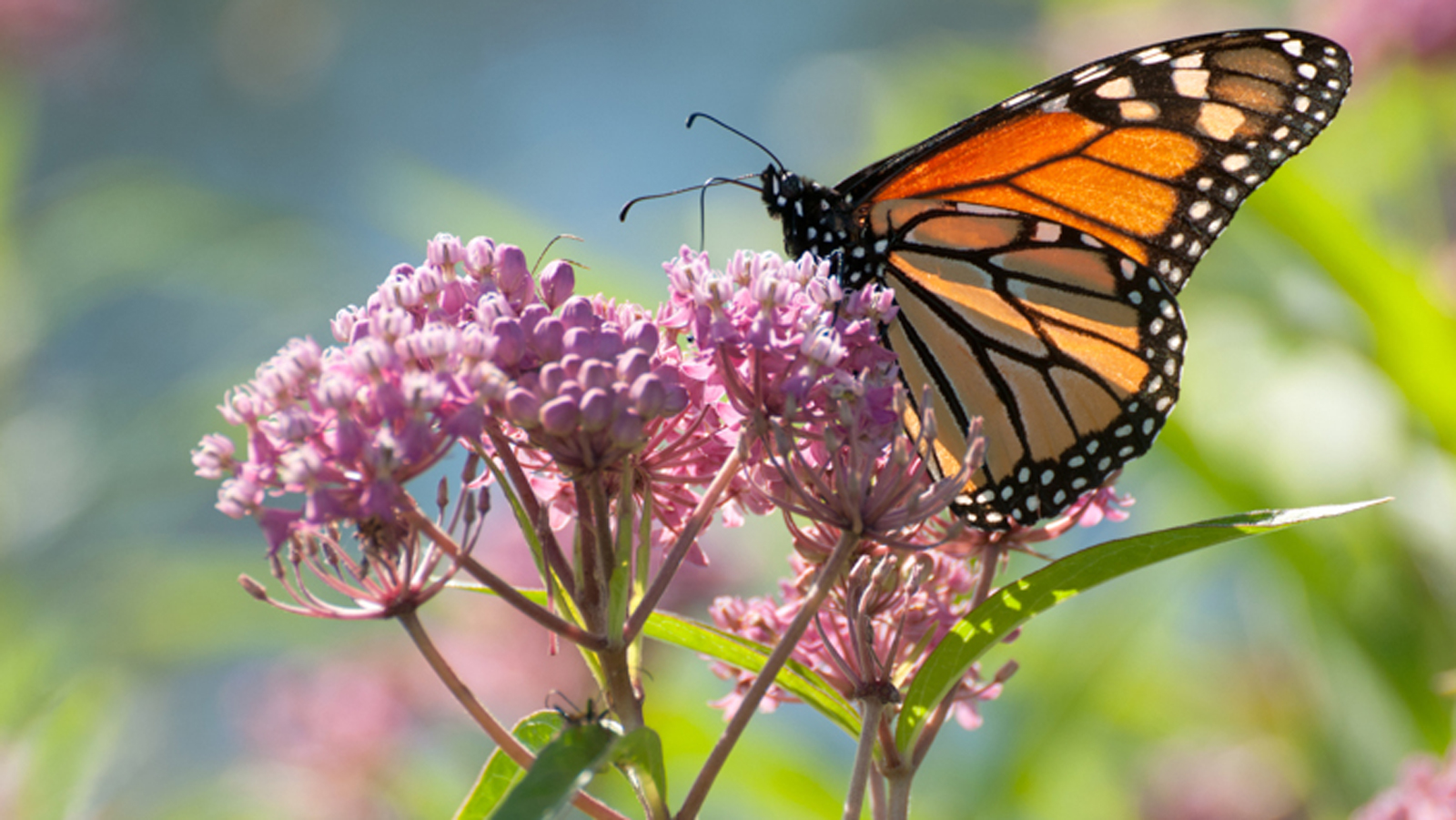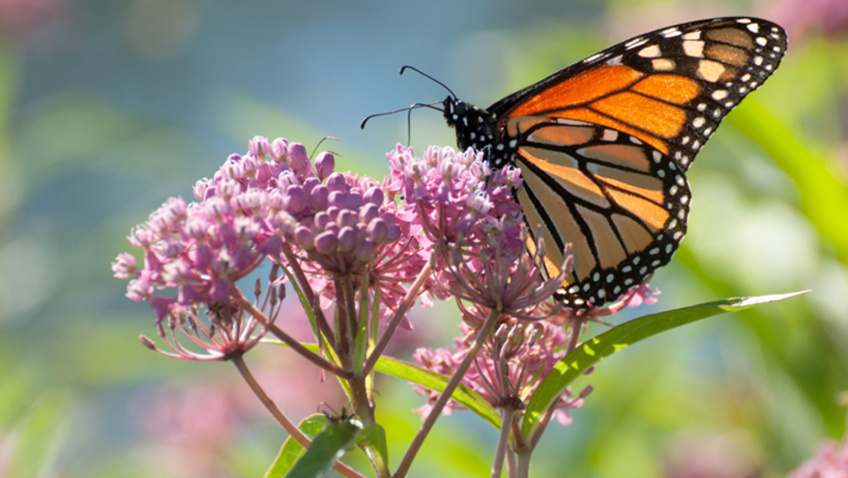In the sweltering heat of a late August day, Will Ricks, a senior environmental scientist at Duke Energy, is busy conducting a pollinator survey. Amidst the vibrant nectar plants and the soft hum of bees, he is working towards a healthier and more sustainable environment for the monarch butterfly and other species that are on the decline.
Ricks points out that there has been a significant reduction in the habitats of not just monarchs, but many native species. He emphasizes the critical role of preserving and enhancing these habitats for the well-being of our ecosystems and the planet.
Birds, bees, and butterflies visiting these habitats increase biodiversity and also pollinate crops. This is crucial for maintaining a healthy food supply as many fruits and vegetables come from flowering plants.
However, many pollinators are facing extinction. Ricks, along with his team at Duke Energy’s Natural Resources Group, is committed to reversing this trend. They are actively involved in conservation projects, habitat enhancement, and other environmental initiatives to protect our natural resources and ensure a better future.
In 2021, their efforts gained momentum when Duke Energy became part of a voluntary conservation agreement to protect the monarch butterfly. The Monarch Candidate Conservation Agreement with Assurances (CCAA) allows the energy and transportation sectors to monitor population trends of monarchs across the country.
During the growing season, Ricks and his team of environmental scientists visited over 80 survey sites in the Midwest, Florida, and the Carolinas to collect data.
“We’re looking at what species are present,” said Ricks, “identifying all the grasses, the abundance of milkweeds and nectar plants, as well as potential threats to the habitat. And all these observations go into a scorecard, which helps us see, by rank, if these sites are increasing or decreasing in habitat quality year over year.”
These findings aid specialists in formulating conservation tactics, such as modifying vegetation management methods or increasing the planting of milkweed, which is crucial for the survival of the monarch.
Duke Energy has been managing trees and vegetation in transmission and distribution rights of way, which are essential corridors for delivering electricity from power plants to homes and businesses, long before the inception of the CCAA.
Korey Meadows, who is in charge of transmission vegetation management for certain regions in the Carolinas, mentioned that his team collaborates with Ricks’ group to minimize environmental impacts.
“We have similar backgrounds as far as our formal education goes, but the application of our knowledge is different,” said Meadows. “So, we lean on their expertise to help direct the execution of our work: to transmit safe, reliable power for customers.”
By incorporating considerations for threatened and endangered species and other natural resources into project planning, the impact of maintenance or construction activities can be reduced through effective vegetation management.
“Environmental compliance is of utmost importance,” says Ricks. “Along with that comes an element of stewardship. It’s not just about adhering to the regulations set by state and federal agencies. It’s about asking ourselves, ‘What more can we do to improve the areas we operate in?’”
Ricks, a graduate of NC State University who later attended grad school at the University of Georgia, was initially inclined towards working at a state or federal agency, unaware of wildlife-related opportunities in the energy sector.
It was only when his classmate, Justin Dycus, secured a position in fisheries at Duke Energy that Ricks became aware of the potential for someone with his qualifications. When a suitable position opened up, he applied and now plays a crucial role in protecting threatened and endangered species and their habitats across Duke Energy’s service areas.
Ricks’ deep connection to the land, rooted in his childhood spent in Halifax County in eastern North Carolina, fuels his dedication to his work.
“With my grandpa being a cattle farmer, and my granddad an agricultural farmer, I grew up in that environment,” said Ricks while adding, “My dad was a veterinarian by trade, but he’s a wildlife steward in retirement. My mom’s a naturalist, a master gardener, and my brother, he’s a fisheries biologist. So, taking care of our natural resources and being good stewards of the land, it’s just what we do.”
Ricks points out that there has been a significant reduction in the habitats of not just monarchs, but many native species. He emphasizes the critical role of preserving and enhancing these habitats for the well-being of our ecosystems and the planet.
Birds, bees, and butterflies visiting these habitats increase biodiversity and also pollinate crops. This is crucial for maintaining a healthy food supply as many fruits and vegetables come from flowering plants.
However, many pollinators are facing extinction. Ricks, along with his team at Duke Energy’s Natural Resources Group, is committed to reversing this trend. They are actively involved in conservation projects, habitat enhancement, and other environmental initiatives to protect our natural resources and ensure a better future.
In 2021, their efforts gained momentum when Duke Energy became part of a voluntary conservation agreement to protect the monarch butterfly. The Monarch Candidate Conservation Agreement with Assurances (CCAA) allows the energy and transportation sectors to monitor population trends of monarchs across the country.
During the growing season, Ricks and his team of environmental scientists visited over 80 survey sites in the Midwest, Florida, and the Carolinas to collect data.
“We’re looking at what species are present,” said Ricks, “identifying all the grasses, the abundance of milkweeds and nectar plants, as well as potential threats to the habitat. And all these observations go into a scorecard, which helps us see, by rank, if these sites are increasing or decreasing in habitat quality year over year.”
These findings aid specialists in formulating conservation tactics, such as modifying vegetation management methods or increasing the planting of milkweed, which is crucial for the survival of the monarch.
Duke Energy has been managing trees and vegetation in transmission and distribution rights of way, which are essential corridors for delivering electricity from power plants to homes and businesses, long before the inception of the CCAA.
Korey Meadows, who is in charge of transmission vegetation management for certain regions in the Carolinas, mentioned that his team collaborates with Ricks’ group to minimize environmental impacts.
“We have similar backgrounds as far as our formal education goes, but the application of our knowledge is different,” said Meadows. “So, we lean on their expertise to help direct the execution of our work: to transmit safe, reliable power for customers.”
By incorporating considerations for threatened and endangered species and other natural resources into project planning, the impact of maintenance or construction activities can be reduced through effective vegetation management.
“Environmental compliance is of utmost importance,” says Ricks. “Along with that comes an element of stewardship. It’s not just about adhering to the regulations set by state and federal agencies. It’s about asking ourselves, ‘What more can we do to improve the areas we operate in?’”
Ricks, a graduate of NC State University who later attended grad school at the University of Georgia, was initially inclined towards working at a state or federal agency, unaware of wildlife-related opportunities in the energy sector.
It was only when his classmate, Justin Dycus, secured a position in fisheries at Duke Energy that Ricks became aware of the potential for someone with his qualifications. When a suitable position opened up, he applied and now plays a crucial role in protecting threatened and endangered species and their habitats across Duke Energy’s service areas.
Ricks’ deep connection to the land, rooted in his childhood spent in Halifax County in eastern North Carolina, fuels his dedication to his work.
“With my grandpa being a cattle farmer, and my granddad an agricultural farmer, I grew up in that environment,” said Ricks while adding, “My dad was a veterinarian by trade, but he’s a wildlife steward in retirement. My mom’s a naturalist, a master gardener, and my brother, he’s a fisheries biologist. So, taking care of our natural resources and being good stewards of the land, it’s just what we do.”


 Conservation Efforts at Duke Energy: Protecting Pollinators and Enhancing Habitats
Conservation Efforts at Duke Energy: Protecting Pollinators and Enhancing Habitats





 Companies
Companies